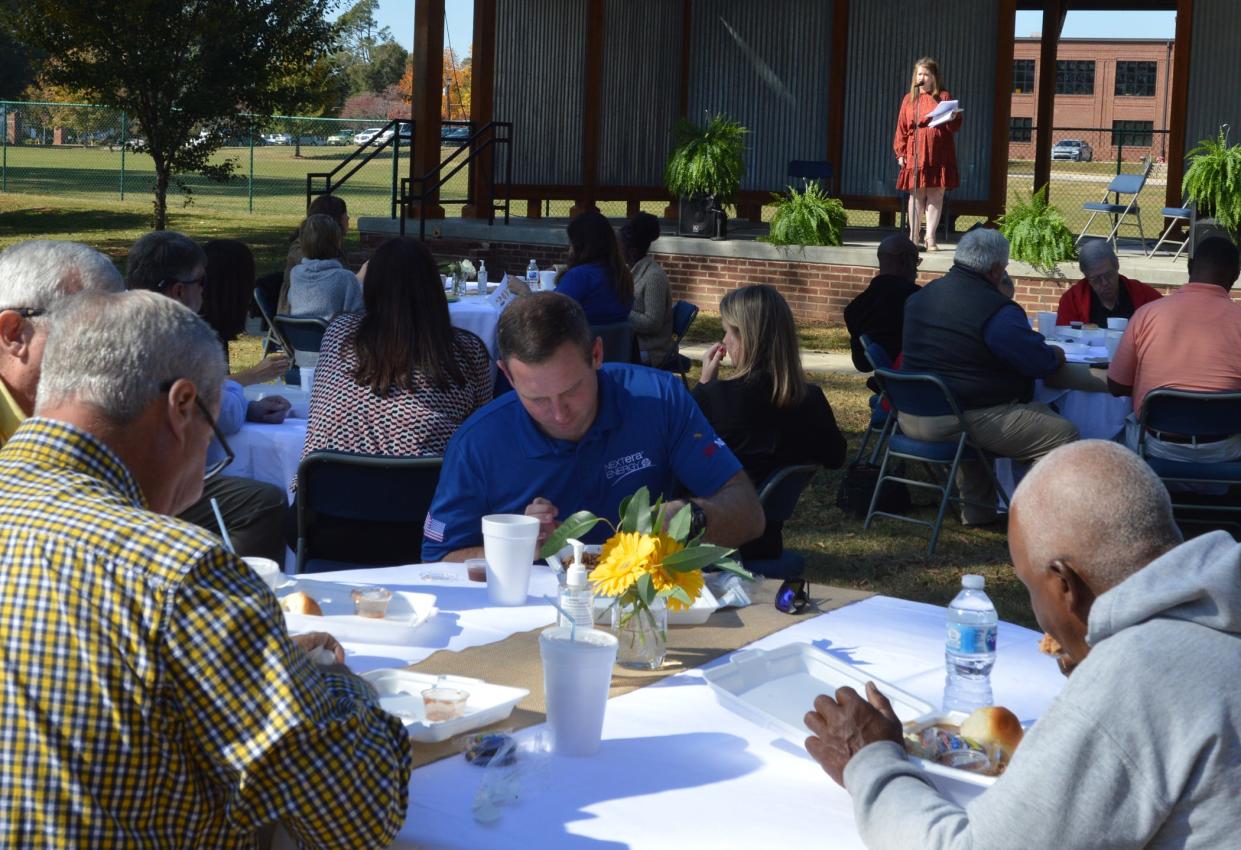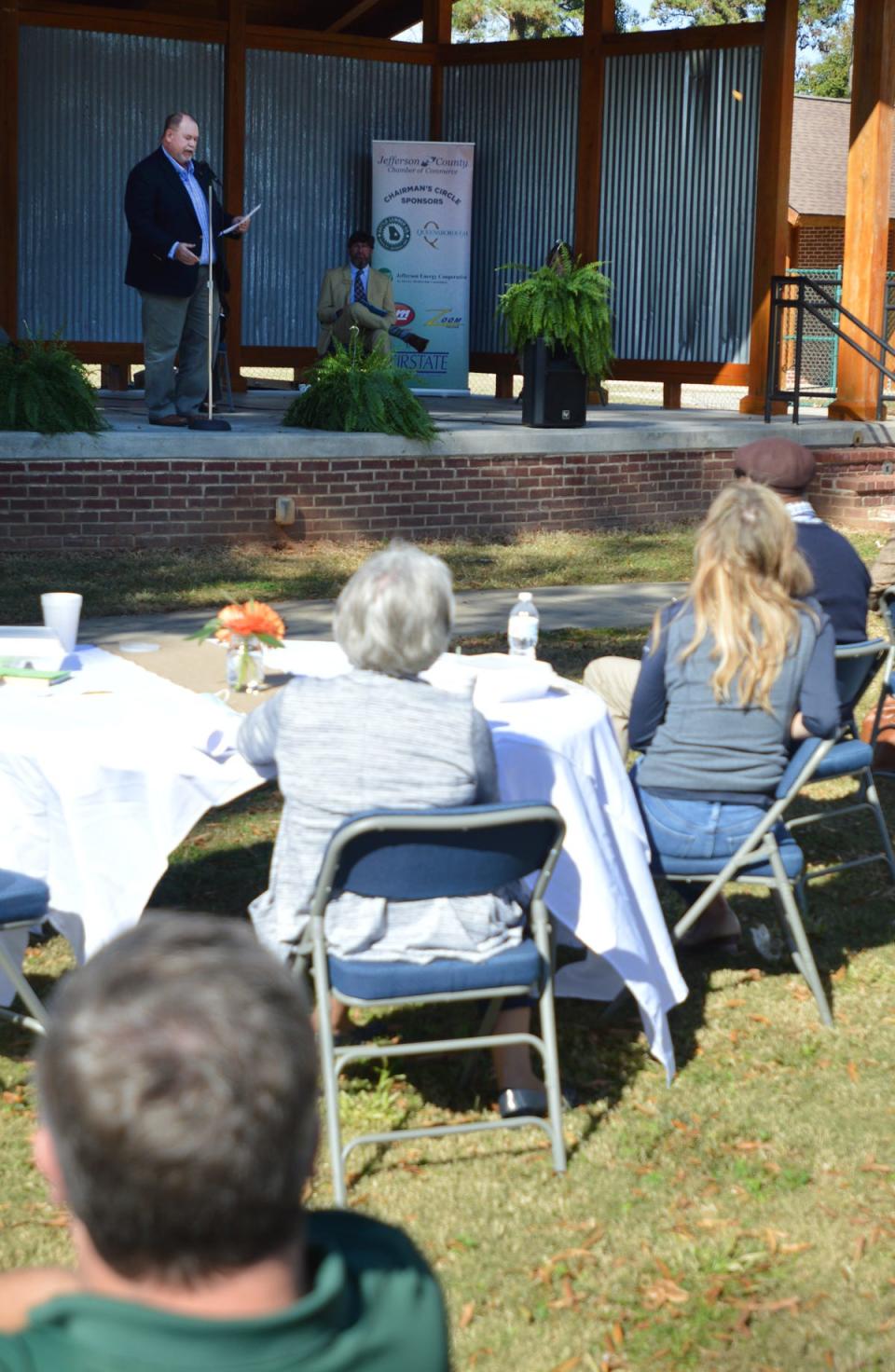Chamber takes a look back at 2021

Jefferson County’s Chamber of Commerce will enter 2022 in an uphill climb, but with a little momentum it did not feel a year ago.
“We are catching up to where we were pre-COVID,” Chamber Director Amy Howard said at the group’s annual meeting in November. “In 2020 everything declined, even in the Chamber world.”
The organization, whose mission is to support a local business environment aimed to advance civic, economic, cultural and social growth, currently has 94 members, nearly what it had before the pandemic struck.
“I foresee that number will grow before the end of the year,” Howard said. “We have several that are interested. That equates to over 2,000 employees that the chamber serves. We had 10 new members in 2021, which is an increase from 2020.”
Howard explained that 55 percent of the membership comes from small businesses and the rest from non-profits, industries, municipalities, educational institutions, governmental agencies, utilities, banks and healthcare.
In 2021 the chamber held ribbon cuttings for eight new businesses and locations, five more than it held the previous year.
“Some of our biggest challenges, not only here but everywhere, are workforce and broadband and we are committed to working toward those goals,” she said.
The chamber also remains dedicated to sponsoring the events and programming it regularly organizes, including the county budget luncheon, lunch and learn events and the legislative breakfast.
The chamber invited local leaders in education, economic development, healthcare and county government to update its members on issues facing their respective fields.
Schools
Superintendent of Jefferson County’s public schools Dr. Molly Howard discussed the recently passed and Education Special Projects Local Option Sales Tax and what these funds will support. She also discussed state funding and how that has changed over the years.
“We have just come through a great recession,” Dr. Howard told the chamber members at the meeting. “For about 16 years the state of Georgia had withheld approximately $16 million in austerity cuts to the school system. The hardest time we were hit was between fiscal year 2011 and fiscal year 2015. About $10 million of the money the state said we were entitled to, they didn’t send us.”
The cuts were reduced after 2018 but they came back in 2021, just as the board grappled with the many changes brought on by the COVID-19 pandemic. The board had planned for hard times, Dr. Howard said, and so they were able to operate off of its fund balance.
“We were one of a few, only a third of school systems across the state that during the recession never had to furlough days that reduced our students’ calendars,” she said.
The recently passed Education SPLOST is expected to raise funds for the school system to replace the classroom wings at Carver Elementary School in Wadley, among other projects. While the front of the school, which includes the cafeteria, was added just a few years ago, the classroom wings were built in the 1950s. Dr. Howard said that the board hopes to begin construction in the fall of 2022.
The school system has 285 employees, 223 of whom are certified teachers or administrators who require a license in their field.
“Right now we are having a very, very difficult time trying to find help, especially bus drivers,” Dr. Howard said. “Everyone across the country is facing a difficulty in hiring.”
During the recession, she said, state colleges and universities saw a significant decline in the number of students who want to become teachers. To address this, Jefferson County has started its own teacher cadet academy designed to foster current high school students who may want to go into the field, so that they might come back to teach here.
Industry
Greg Sellars, Executive Director of the Jefferson County Development Authority, said that he really does not like to talk about many of the projects that he works with day in and out, who are looking at locating operations to the area. All the projects are fluid and might not end with a company investing and then opening a business locally.
Pending projects are often referred to using general terms until a business confirms that it will be locating in the area.
“Just this year alone we have had five different prospect inquiries,” he said. “Project Premium eliminated us and chose a location in South Carolina.”
Four others are still considering operations in the county-owned industrial parks. Project Yellow Pine could bring 275 jobs, use 200 acres and invest $350 million locally. Project Glazing could bring between 10 and 300 jobs and invest up to $40 million. Project Shovel represents a potential $90 million investment and 300-plus jobs. Project Sunny Site could bring over 1,000 jobs and $168 million in investment.
All of these industries are still considering locating to the Kings Mill Commerce Park in Wrens.
The county has added two new tenants to buildings in the Louisville industrial park. Both are local businesses that have plans to add employees in the near future.
“Most of the industries I’m dealing with had a great year, ” Sellars said. “Some even had their best year in their existence, despite the COVID environment. A lot of them are in a mode of expansion.”
Motion Metalworks in Wrens, he said, which started in its owner’s garage, is now up to 36 full time employees.
Jefferson Hospital
Hospital CEO Wendy Martin said that it has used CARES Act funds to upgrade equipment and put a new roof on the hospital, a project that alone was almost $900,000.
“It was very much needed and will have us in great shape for the future,” she said.
Other purchases included new radiology equipment and ventilators. The hospital has also opened its new behavioral health inpatient clinic.
“In the near future we will be opening the intensive outpatient program, which will be a group therapy program for behavioral health,” Martin said.
The hospital added a hospitalist and is partnering with new doctors, physician assistants and nurse practitioners in some departments.
“Previously, our primary care doctors at all of our clinics and some of our ER providers were covering our inpatient unit, going back and forth when the nurses needed them on the floor,” Martin said.
There is now a provider on the floor nine hours a day, every day, she said.

County Government
“Jefferson County is doing very well financially,” said County Administrator Jerry Coalson. “We’ve had eight to ten years of good financial management. I give credit to your commissioners and the last two administrators....I inherited a very good situation and it’s my responsibility to keep that going.”
The county just approved a $26 million 2022 fiscal year budget. The general fund portion of that is $16.7 million, which is a little high because of an ongoing landfill project. The county millage rate, set at 16.991 mills, has not changed in the last two years, Coalson said.
The county has finished construction of six more cells at its landfill, an expansion that should provide capacity for another 12 to 15 years.
Coalson said that work continues at Ogeechee Crossing Park, where the disk golf course was recently completed. The county received a $900,000 outdoor stewardship grant for the park and plans are to begin construction over the next few weeks on the next phase of the project, which will include the addition of 14 RV campsites, multi-purpose trails, an outdoor classroom and a kayak launch into the Ogeechee River.
“A lot of people ask about the American Recovery Act or ARPA funds,” Coalson said. “Jefferson County is going to receive just under $3 million. The commissioners’ plan is primarily to leverage these funds to try to get other federal or state funds to do larger projects.”
One of the biggest issues currently facing the county is the lack of broadband or high internet speed.
“Ninety-five percent of Jefferson County businesses and residences fall below the state standard for broadband service,” Coalson said. This remains to be a top priority for the commissioners, he added.
This article originally appeared on Augusta Chronicle: Chamber takes a look back at 2021

